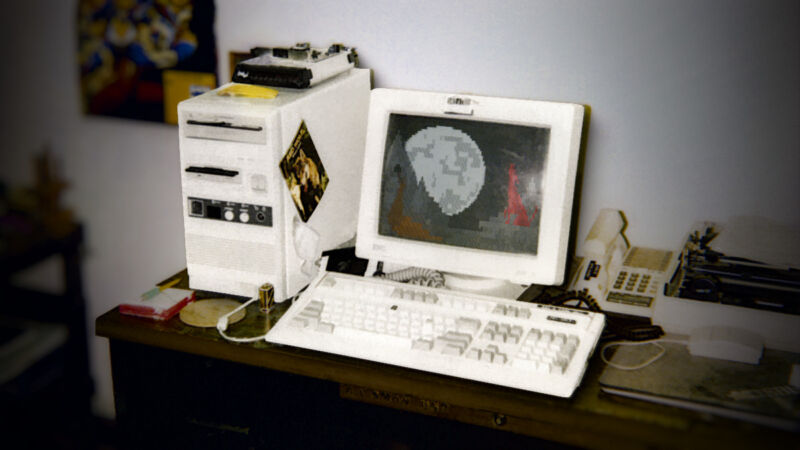
Enlarge / Benj Edwards' computer running The Cave BBS in 1994. (credit: Benj Edwards)
Thirty years ago last week—on November 25, 1992—my BBS came online for the first time. I was only 11 years old, working from my dad's Tandy 1800HD laptop and a 2400 baud modem. The Cave BBS soon grew into a bustling 24-hour system with over 1,000 users. After a seven-year pause between 1998 and 2005, I've been running it again ever since. Here's the story of how it started and the challenges I faced along the way.
Enter the modem
In January 1992, my dad brought home a gateway to a parallel world: a small black plexiglass box labeled "ZOOM" that hooked to a PC's serial port. This modem granted the power to connect to other computers and share data over the dial-up telephone network.
While commercial online services like CompuServe and Prodigy existed then, many hobbyists ran their own miniature online services called bulletin board systems, or BBSes for short. The Internet existed, but it was not yet widely known outside academic circles.
Read 42 remaining paragraphs | Comments

Enlarge / Benj Edwards' computer running The Cave BBS in 1994. (credit: Benj Edwards)
Thirty years ago last week—on November 25, 1992—my BBS came online for the first time. I was only 11 years old, working from my dad's Tandy 1800HD laptop and a 2400 baud modem. The Cave BBS soon grew into a bustling 24-hour system with over 1,000 users. After a seven-year pause between 1998 and 2005, I've been running it again ever since. Here's the story of how it started and the challenges I faced along the way.
Enter the modem
In January 1992, my dad brought home a gateway to a parallel world: a small black plexiglass box labeled "ZOOM" that hooked to a PC's serial port. This modem granted the power to connect to other computers and share data over the dial-up telephone network.
While commercial online services like CompuServe and Prodigy existed then, many hobbyists ran their own miniature online services called bulletin board systems, or BBSes for short. The Internet existed, but it was not yet widely known outside academic circles.
Read 42 remaining paragraphs | Comments
December 01, 2022 at 05:30PM

Post a Comment